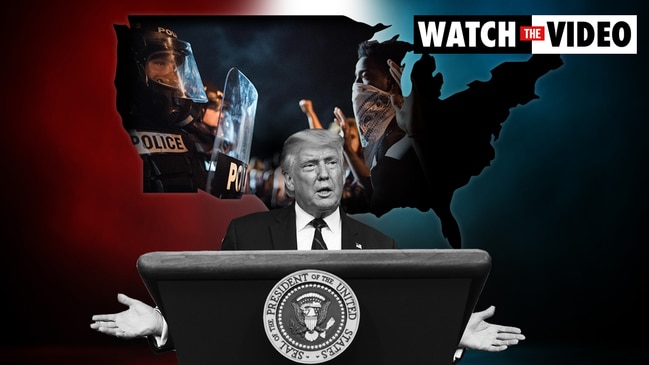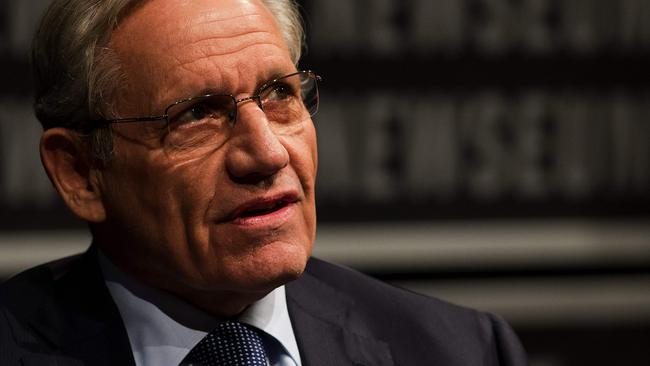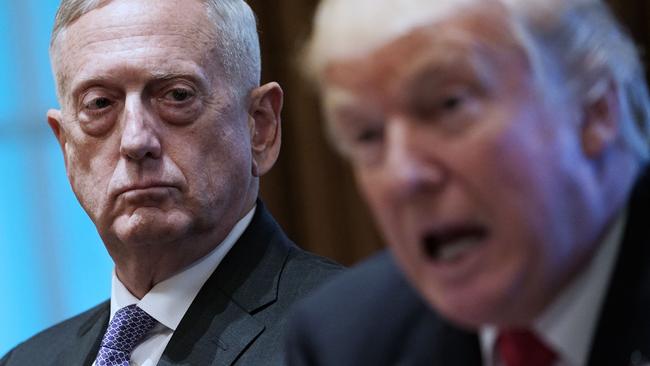Bob Woodward book: Trump staff ‘shocked’ by his behaviour behind the scenes
A new book by one of the legendary Watergate reporters reveals the shock, frustration and occasional horror of Donald Trump’s staff.

Books & Magazines
Don't miss out on the headlines from Books & Magazines. Followed categories will be added to My News.
About halfway through Watergate journalist Bob Woodward’s new book on Donald Trump, there is a telling quote from the President’s son-in-law, Jared Kushner.
“In the beginning, 20 per cent of the people we had thought Trump was saving the world, and 80 per cent thought they were saving the world from Trump,” Mr Kushner says, describing the people working in Mr Trump’s administration.
“Now I think we have the inverse. I think 80 per cent of the people working for him think that he’s saving the world, and 20 per cent, maybe less now, think they’re saving the world from Trump.”
This is quite the admission. Apparently, a significant number of Mr Trump’s appointees think they need to “save the world” from their own boss. It’s the sort of thing you cannot imagine being said about any other political leader.
And it neatly captures one of the core themes of the book.
Rage, as it is so succinctly named, is essentially split in two.
Half of it outlines the 18 interviews Woodward recorded with Mr Trump, giving readers a vivid window into what the President’s state of mind was like at key moments throughout the last year.
The other half lays bare the frustration, shock and occasional horror some administration officials felt behind the scenes as they struggled to deal with Mr Trump’s allegedly fickle attention span and impulsive decision-making.
RELATED: Woodward book’s deflating revelation about Trump
RELATED: Trump privately admits he ‘played down’ coronavirus


I say “felt”, past tense, because most of the people in question are no longer part of the administration.
Woodward focuses on three men in particular: Dan Coats, a Republican politician who served as the President’s director of national intelligence; General James Mattis, who was secretary of defence; and oil executive Rex Tillerson, who was Mr Trump’s first secretary of state.
“Mattis, Tillerson and Coats are all conservatives or apolitical people who wanted to help him and the country. Imperfect men who answered the call to public service. They were not the deep state,” he writes.
“Yet each departed with cruel words from their leader. They concluded that Trump was an unstable threat to the country. Think about that for a moment – the top national security leaders thought the President of the United States was a danger to the country.”
In other words, Mr Tillerson, Mr Coats and Gen Mattis were all part of that “80 per cent” Mr Kushner referred to.
It was Mr Coats’ job, from 2017-2019, to brief Mr Trump on matters of national security, a task which often proved challenging.
“Coats never knew which Trump he’d find in residence when he walked into the Oval Office three times a week for the President’s Daily Brief,” Woodward writes.
“Some days, Trump would be in a fine mood, even good. Other days Trump would lash out abusively. ‘I don’t trust the intelligence,’ he said, making it clear he saw the intelligence people as enemies.
“Coats began to think Trump was impervious to facts. Trump had his own facts – nearly everyone was an idiot, and almost every country was ripping off the United States.
“The steady stream of ranting was debilitating. The tension never abated, and Coats would not bend facts to suit the President’s preconceptions or desires. Coats was shocked.”
Mr Coats’ inability to get through to Mr Trump weighed heavily on him. He barely slept and lost weight under the stress of the job.
Gen Mattis told similar stories about his own conversations with Mr Trump.
“It is very difficult to have a discussion with the President,” he told others in the administration, according to Woodward.
“If an intel briefer was going to start a discussion with the President, they were only a couple of sentences in and it could go off on what I kind of irreverently call those Seattle freeway off-ramps to nowhere. Shoot off onto another subject.
“You could try, but then something that had been said on Fox News or something was more salient to him.
“The facts would be dismissed, and we’d be off on one of those ramps that circled around and started going. And then you’re sitting there, and it’s not deference at that point. It’s grasping for a way to get it back on subject. And it was just very hard.”
After one especially exasperating meeting, at which Mr Trump brushed aside his staff’s objections and ordered them to withdraw US troops from both Afghanistan and South Korea, Mr Coats and Gen Mattis privately commiserated with each other.
“The President has no moral compass,” the secretary of defence said.
“True. To him, a lie is not a lie. It’s just what he thinks. He doesn’t know the difference between the truth and a lie,” Mr Coats replied.
Gen Mattis said a time might come when he, Mr Coats and Mr Tillerson would “have to take collective action”, speaking out against Mr Trump together.
He said the President was “dangerous” and “unfit” for the job.
Woodward also quotes Gen Mattis admitting he often ignored whatever Mr Trump said because his orders were “so random, impulsive and unthoughtful”.
RELATED: James Mattis quits over Trump’s Syria withdrawal
RELATED: Mattis slams Trump’s response to mass protests

Gen Mattis eventually quit in protest at Mr Trump’s decision to remove most US military forces from Syria in late 2018.
“When I was basically directed to do something that I thought went beyond stupid to felony stupid, strategically jeopardising our place in the world and everything else, that’s when I quit,” he says in the book.
Speaking to Fox News overnight, the President hit back at his former Cabinet member, writing him off as a “terrible general”.
“I gave him the job. I didn’t like him. I fired him. And he was a terrible – to me, he was a terrible general and a bad leader,” Mr Trump said.
More broadly, he has dismissed Woodward’s book as “a political hit job”.
And inside its pages, Mr Kushner makes it clear that the administration does not regret “getting rid of” any of these disgruntled former officials.
“If you look at the evolution over time, we’ve gotten rid of a lot of the overconfident idiots. And now he’s got a lot more thoughtful people who kind of know their place and know what to do,” he says.
That list of “overconfident idiots” presumably also includes the former White House chief of staff, General John Kelly, who is quoted labelling Mr Trump’s habit of constantly changing his mind on major decisions “crazytown”.
As we mentioned earlier, the rest of the book is largely devoted to describing Woodward’s interviews with the President, most of which focused on Mr Trump’s ever-shifting response to the coronavirus.
The most explosive revelations from those chapters were already revealed in excerpts published by US media last week. In short, Mr Trump knew how deadly and contagious the virus was in early February, but admitted to Woodward that he “played down” the threat publicly in an effort to avoid creating “panic”.
“The plague. It’s a horrible thing. It’s unbelievable. Can you believe it? It moves rapidly and viciously. If you’re the wrong person and it gets you, your life is pretty much over, if you’re in the wrong group,” Mr Trump said privately on April 5, at a time when he was publicly telling Americans it was going to “go away”.

Woodward writes that he was “distressed” by Trump’s attitude towards the virus.
“Trump never did seem willing to fully mobilise the federal government and continually seemed to push problems off on the states,” he says.
“There was no real management theory of the case or how to organise a massive enterprise to deal with one of the most complex emergencies the United States had ever faced. Beyond being a reporter, I was worried for the country.”
He quotes Dr Anthony Fauci, a member of the White House’s coronavirus task force, saying Mr Trump’s leadership is “rudderless” and his “attention span is like a minus number”.
Throughout the interviews, Mr Trump seems most concerned about the pandemic’s impact on his re-election bid. And that impact could be significant.
Woodward cites Republican Senator Lindsey Graham, who told the President his real election opponent was the virus – not Democratic Party nominee Joe Biden.
“If you f*** it up, there’s nothing you can do to get re-elected,” Mr Graham said.
“If you seem to, you know, manage it well, you’re pretty much unbeatable. You keep the body count down, people will see you as somebody that was successful.”
Woodward’s book is a little different from most of the tell-all memoirs that have emerged during the Trump presidency.
It is neither the bitter account of a fired staffer, like former national security adviser John Bolton, nor the recollection of someone who remains loyal to Mr Trump, such as former press secretary Sarah Huckabee Sanders.
This is, at its core, an extended piece of reporting. The interviews with Mr Trump have all been taped, so he can’t dismiss them as fake news.
But Woodward does not shy away from expressing his own opinions, rooted in decades of experience covering American presidents. No doubt, Mr Trump will disagree strongly with his final verdict.
“For nearly 50 years, I have written about nine presidents from Nixon to Trump – 20 per cent of the 45 US presidents,” Woodward says.
“A president must be willing to share the worst with people, the bad news with the good. All presidents have a large obligation to inform, warn, protect, to define goals and the true national interest.
“It should be a truth-telling response to the world, especially in crisis. Trump has, instead, enshrined personal impulse as a governing principle of his presidency.
“When his performance as president is taken in its entirety, I can only reach one conclusion. Trump is the wrong man for the job.”
Originally published as Bob Woodward book: Trump staff ‘shocked’ by his behaviour behind the scenes

